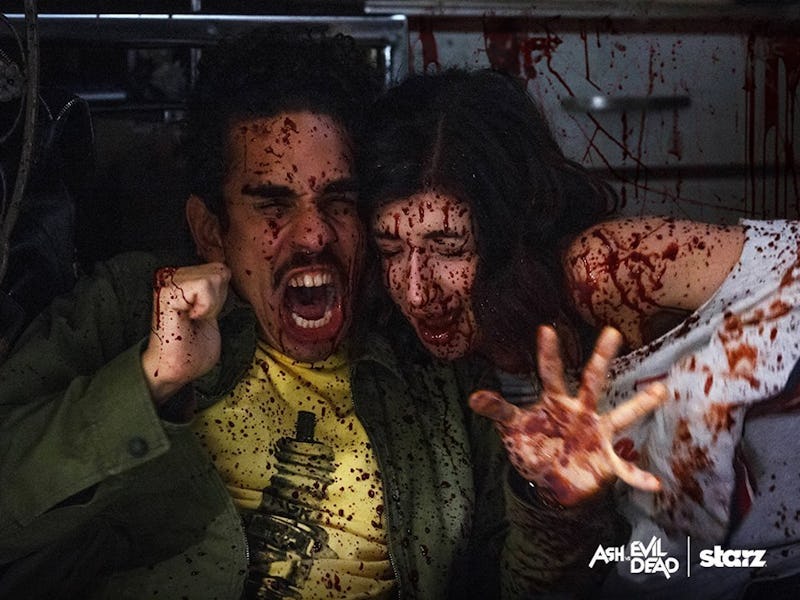Ash vs Evil Dead Is a Gory, Psychedelic Delight
Ash's ego and Sam Raimi's tone control are a successful combination for the Starz horror comedy.

Ash vs Evil Dead is a triumph for horror comedy. The genre has stumbled over itself trying to find that sweet spot between the earnest emotion in American Werewolf in London and the horror-nerd’s reverence of Scream, but most projects billing themselves as horror comedies are amalgamations of gore, flimsy punchlines, and gutless critique. Unfortunately, when the tropes of both horror films and comedies collide, we most often end up with blood-soaked nonsense. For instance, is anyone still watching Scream Queens?
Horror fans had high hopes for Ash vs Evil Dead even before its release, because Sam Raimi has been the reigning king of camp since the release of his original Evil Dead films in the 1980s. His Spider-Man trilogy wasn’t perfect, but he was out of his element without cackling ghouls. Peter Parker’s story, though admittedly goofy, has an innocent and well-meaning center, which is not Raimi’s wheelhouse. Drag Me to Hell was closer to Raimi’s style, and the film put him back in horror fans’ good graces. Through all of that, what have we learned? Give Raimi a bloodbath, a hero with a chainsaw for an arm, and let him set the whole mess to an electric guitar score, and you’ve got yourself a working horror comedy that is as funny as it is thrilling.
Raimi is best suited to a protagonist like Ash Williams, a character who employs simple objectives like “get the girl” and “destroy the zombified old lady.” Ash’s dialogue is so well-crafted that his bravado makes him more endearing with each passing episode. When Kelly, one of Ash’s young companions, asks him to help save her father, he says, “Look, I get that you want to save your dad, but I’m trying to save all the dads everywhere. And the mommies and the babies. So, you’ll forgive me, but I need to duct tape these bullet holes up before I roll.” In trying to comfort Pablo, another teenage partner, Ash says “I remember when I was like you. Young, dumb, and full of… conflicting… emotions.” He is certifiably cool in a way that Raimi’s other main characters haven’t been, and this allows Raimi’s writing to come off as punchy, as opposed to callous.
Striking just the right tone is the secret to horror comedy. We have to care about what happens to the characters, but not enough that it bums us out. There are moments when Ash vs Evil Dead hints at the emotional core of the story — several of the ghouls chasing Ash and his young friends call the hero a “sad old loser.” But because Ash himself doesn’t dwell on being an underachiever, the audience knows to accept his insecurities as a mere subplot. His weakness makes it all the more satisfying when Ash executes a flying leap into a pile of the zombies he calls “Deadites”.
Raimi’s subtle emotional undertone is complemented by the near-constant forward action. The characters even describe their own choices as relentless and bombastic. They “bust through doors,” “whip out the boom-stick,” and “rip through the carnage,” never stopping to reflect on any particular situation for too long. Even the re-release of the ancient evil which sets the plot in motion occurs because Ash drunkenly tells a young girl he’s brought home to read aloud from the Book of the Dead. Ash realizes this in the first scene of the show, says “fuck!” out-loud, and doesn’t bother to beat himself up for his mistake. There are Deadites to kill, after all.
Mistakes have always been a part of the Evil Dead franchise, specifically the mistakes we all make as teenagers, motivated by lust or fear or social pressures. Additionally, alcohol and hallucinogenic have been embedded into Evil Dead since the first film, in which a group of teens gather alone in the forest to get drunk and have sex. Ash vs Evil Dead continues this tradition; Ash is often the first character to notice that a minor character is a Deadite in disguise, but in some cases he’s unsure if these visions are hallucinations. In last week’s episode, “Brujo,” Ash consults a “witch doctor” for advice, and he experiences his longest hallucinatory trip to date, slipping into the space between fighting Deadites and reflecting on his past. The subject of hallucination is expanded when Kelly suffers a concussion and begins seeing more demons around her, both real and imagined.
In the pilot, Lucy Lawless’ character Ruby tells a cop chasing Ash and his companions, “sometimes what you think you saw is exactly what you saw.” She sums up the primary objective of Ash vs Evil Dead here: to create an engaging visual spectacle which values action over internal conflict. The show presents a unique combination of both comedic and horror-related variables for fans to enjoy, rather than meta-commenting fruitlessly on projects which have come before it. The show is a project Ash himself would enjoy: funny, ruthless, and not exceedingly intellectual. Because of that purity, it feels complete.